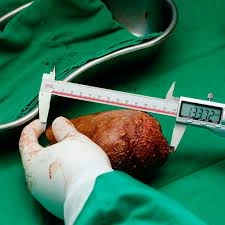Author's details
- Hakim A Abubakre
- BA (Hons) International Business Management, Msc Digital Marketing.
Reviewer's details
- Dr. Khashau Eleburuike
- MBBS (Ilorin) MSc. Global Health Karolinska Institute.
- Resident doctor in family medicine in Northen Sweden.

- Date Published: 2025-06-15
- Date Updated: 2026-01-02
Kidney Stones –What You Need to Know
Key Messages
- In Sub-Saharan Africa, improving awareness, access to care, and healthy diets is essential for better cholesterol control.
- Kidney stones are hard lumps formed from minerals and salts in concentrated urine.
- Main risk factors include dehydration, high salt and animal protein diets, obesity, diabetes, and family history.
- Types of stones include calcium, uric acid, struvite, and cystine stones.
- Symptoms can be severe pain, blood in urine, and sometimes fever or vomiting.
What Are Kidney Stones?
Kidney stones are hard lumps made from substances in the urine, such as minerals and salts. They form when the urine becomes concentrated, allowing minerals to stick together and form crystals.
Kidney stones are more common in men than women and often occur between the ages of 30 to 60. People living in hot climates (like many parts of Africa) are at higher risk because they may lose more water through sweat and produce less urine, which increases the chances of stone formation.
Causes and Risk Factors
Kidney stones form when urine contains more crystal-forming substances—like calcium, oxalate, and uric acid—than the fluid in the urine can dilute.
Risk factors include:
- Dehydration – Not drinking enough water is a major cause.
- Diet – High salt, sugary drinks (especially soda), and animal protein increase the risk.
- Obesity and diabetes
- High blood pressure
- Family history of kidney stones
- Infections of the urinary tract.
What are the types of Kidney Stones?
There are different types of stones, depending on what they're made of:
- Calcium stones – The most common. Usually formed from calcium oxalate or calcium phosphate.
- Uric acid stones – Can form when the urine is too acidic, often linked with diets high in red meat.
- Struvite stones – Often caused by urinary tract infections.
- Cystine stones – Rare and usually due to a genetic condition called cystinuria.
What are the Signs and Symptoms of Kidney Stones?
You might not feel anything until the stone moves. When it does, symptoms may include:
- Sudden, sharp pain in the lower back, side, or groin
- Pain that comes and goes in waves
- Pain or burning when urinating
- Pink, red, or brown-colored urine
- Cloudy or smelly urine
- Feeling the need to urinate often, but only passing small amounts
- Nausea and vomiting
- Fever and chills if there's an infection
Self-Care and Home Remedies
If you have a small kidney stone, it may pass naturally. Here are ways to help:
- Drink plenty of water – Aim for at least 2.5 to 3 liters per day.
- Pain relievers – Use paracetamol or ibuprofen for pain.
- Avoid sugary drinks, especially fizzy sodas.
- Limit salt and red meat in your diet.
- Eat fruits and vegetables – Especially those high in citrate, like lemons.
When Should You See a Medical doctor?
Seek medical attention immediately if:
- You have severe pain in the back, side, or lower abdomen
- You experience pain while urinating
- There is blood in your urine
- You have a fever or chills
- You are vomiting or can’t keep fluids down
- The pain is too much to bear
How can Kidney stones be prevented?
- Stay hydrated – Drink 2.5 to 3 litres of water daily, especially in hot weather.
- Use lemon or lime juice – Natural citrate can help prevent stones.
- Eat less salt and processed foods.
- Avoid sugary and fizzy drinks like sodas.
- Maintain a healthy weight and manage conditions like diabetes or hypertension.
- Curhan GC. “Epidemiology of stone disease.” Urologic Clinics of North America. 2007;34(3):287-293.
- Romero V, Akpinar H, Assimos DG. “Kidney stones: A global picture of prevalence, incidence, and associated risk factors.” Rev Urol. 2010;12(2-3):e86–e96.
- Mayo Clinic. https://www.mayoclinic.org/diseases-conditions/kidney-stones/symptoms-causes/syc-20355755
- Khan, S.R., Pearle, M.S., Robertson, W.G., Gambaro, G., Canales, B.K., Doizi, S., Traxer, O. and Tiselius, H.G., 2016. Kidney stones. Nature reviews Disease primers, 2(1), pp.1-23.
- Parmar, M.S., 2004. Kidney stones. Bmj, 328(7453), pp.1420-1424
